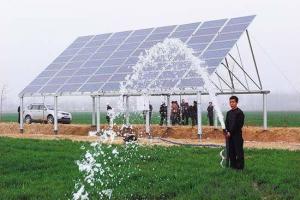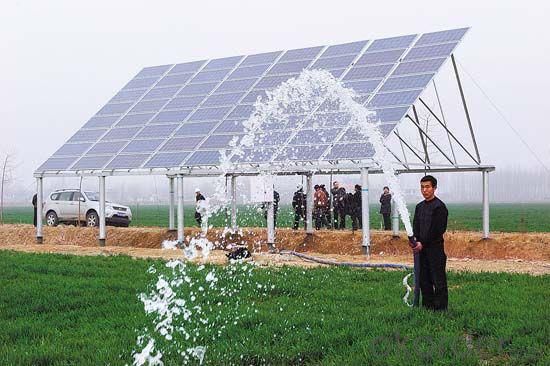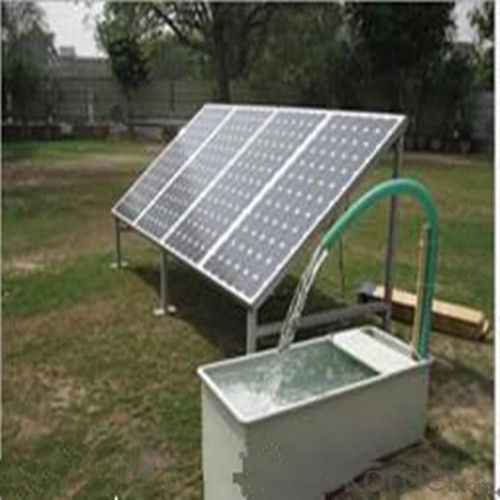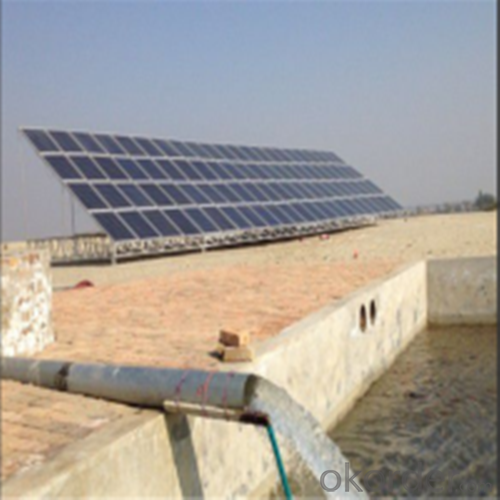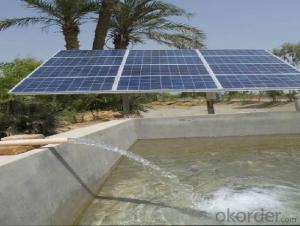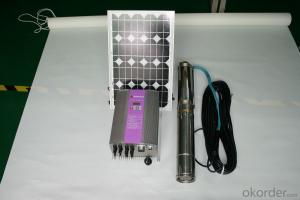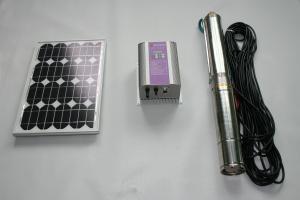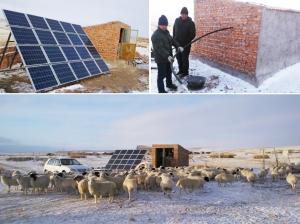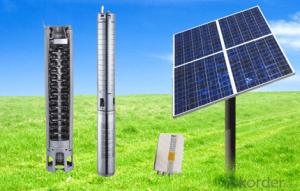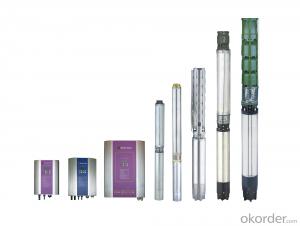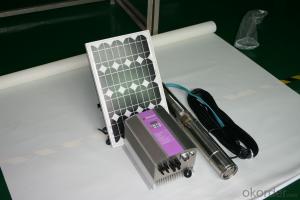Fountain Solar Pump Kit:Solar Powered Water Pump System for Irrigation with Low Price
- Loading Port:
- Shanghai
- Payment Terms:
- TT OR LC
- Min Order Qty:
- 1 set
- Supply Capability:
- 1000 set/month
OKorder Service Pledge
OKorder Financial Service
You Might Also Like
Solar Powered Water Pump System For Irrigation With Low Price
DC solar water pumping system consists of the motor, pump, controller, solar array and some other accessories, such as water level sensor, float switch, etc. Considered that storing water is more efficient than storing electricity, the system is designed to directly drive the pump without battery which can reduce the construction and operating cost and routine maintenance effectively.The PV array consists of multiple solar panels connected in series/parallel, which can supply the whole system as power source by converting the absorbed solar radiation energy to the electrical energy. The pump driven by a brushless DC permanent magnet motor draws water from deep-well or river. The pumped water is then fed into reservoir or water tank, or connected to the irrigation system or fountain system directly.
Advanced Technology
Applications Innovation
The efficiency of DC brushless permanent magnet motor has been increased up to 25% in comparison with traditional asynchronous motor.
Technology Innovation
Stator and rotor are sealed by environment friendly casting resin.Motor insulation resistance can be hold higher than 300MΩfor more than 10 years, which consumedly increased the security and reliability of the submersible motor.
Structure Innovation
Casting resign technology processed stator and rotor as well as the water lubricated bearing make the submersible pump environment friendly.
Feature
High Efficiency & High Reliability
DC Brushless Permanent Magnet Motor
Minimum Maintenance, long Service Life
Environment Friendly Materials, Lubricated Without Oil
Application
Village or Family Water Supply
Animal Drinking Water & Livestock Watering
Garden/Courtyard Irrigation
Swimming Pool
Water Supply for Bivouac or Camping Car
Water Supply for Remote Area
Automatic Control
Operate Automatically, No Need Watching
Maximum Power Point Tracking (MPPT)
Dry-run Protection
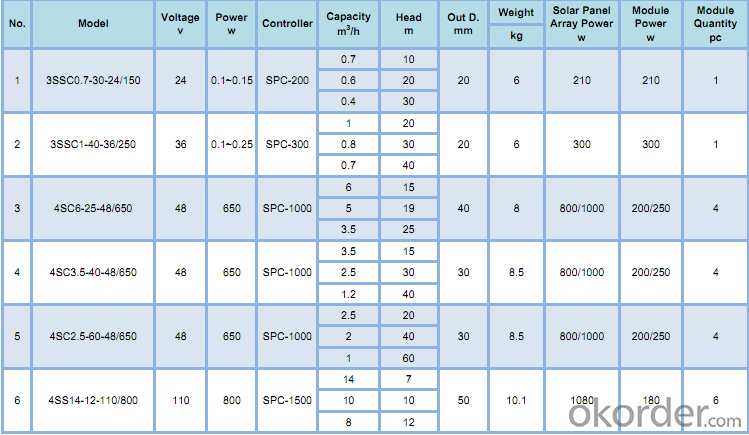
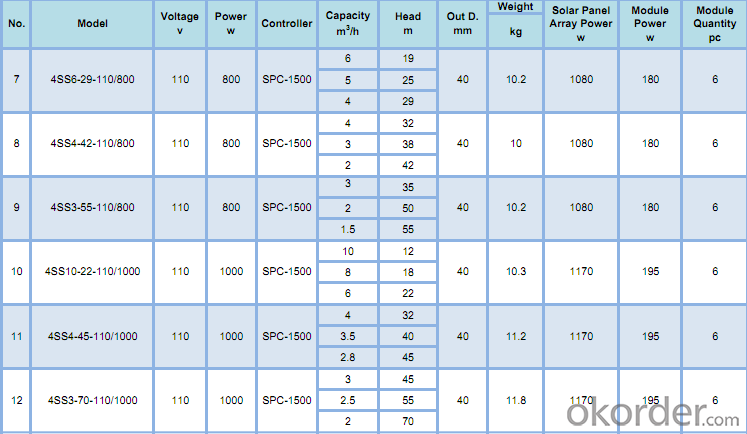
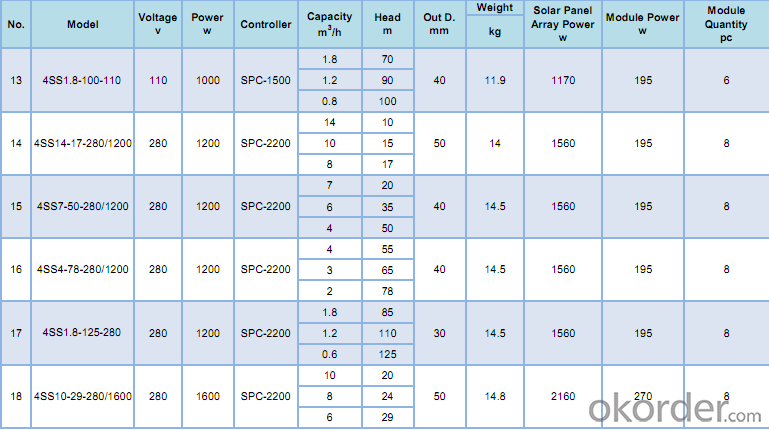
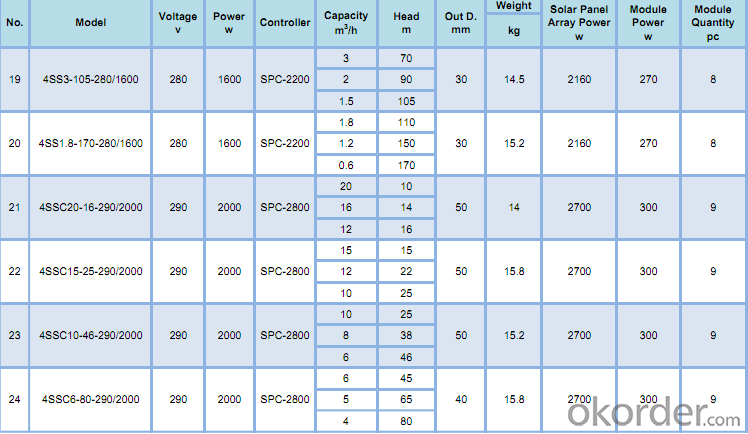
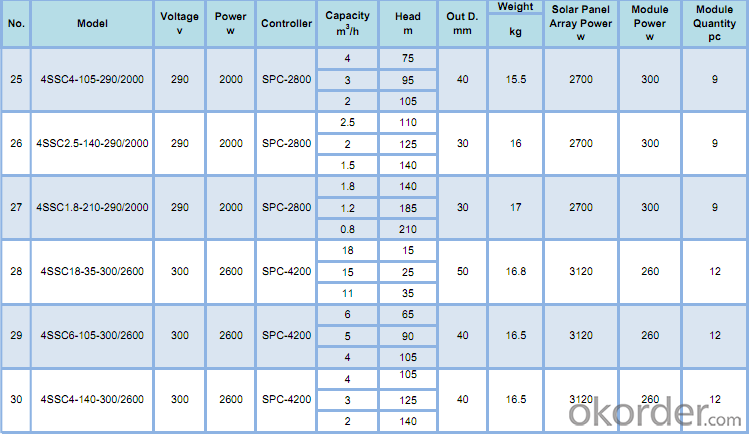
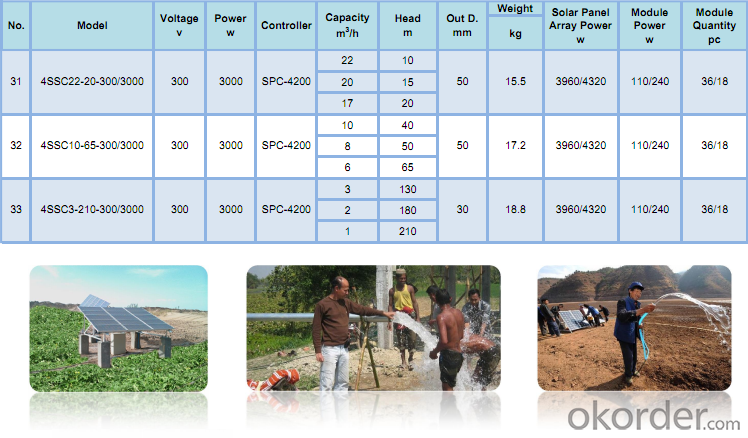
- Q: How does a solar pump handle sediment or debris in water?
- A solar pump typically uses a filtration system or a screen at the intake to prevent sediment or debris from entering the pump. The filter or screen helps to keep the water clean and free from particles, ensuring the smooth and efficient functioning of the pump.
- Q: Can a solar pump be used for swimming pools?
- Yes, a solar pump can be used for swimming pools. Solar pumps are a great environmentally-friendly option for circulating and filtering pool water, as they use energy from the sun to power the pump. They are cost-effective in the long run as they can reduce electricity bills and are low-maintenance. Additionally, solar pumps can be easily integrated into existing pool systems and can help maintain clean and clear pool water.
- Q: Can a solar pump be used in areas with limited access to reliable internet or communication networks for monitoring?
- Yes, a solar pump can be used in areas with limited access to reliable internet or communication networks for monitoring. Solar pumps are designed to operate independently of internet or communication networks. They typically rely on solar energy and do not require constant monitoring or connectivity for their basic functioning. However, in such areas, monitoring and maintenance tasks may need to be carried out manually or through alternative means, such as periodic site visits or using local communication systems like radio or satellite networks.
- Q: Can a solar pump be used in areas with limited access to water desalination systems?
- Yes, a solar pump can be used in areas with limited access to water desalination systems. Solar pumps are an efficient and sustainable solution for accessing water from various sources such as rivers, lakes, wells, or even the ocean. While they do not directly desalinate water, solar pumps can be used to extract water from saline sources, and then alternative methods like solar stills or other desalination systems can be employed to treat the water and make it suitable for consumption or irrigation.
- Q: How do I troubleshoot common issues with a solar pump system?
- Troubleshooting common issues with a solar pump system can be done through a systematic approach that involves identifying and addressing potential problems. Here are some steps to help you troubleshoot and resolve issues with your solar pump system: 1. Check the power supply: Ensure that the solar panels are receiving adequate sunlight and the battery is charged. Verify if there are any loose connections or damaged wires that may affect the power supply. 2. Inspect the pump: Examine the pump for any visible signs of damage or blockages. Clean out any debris or obstructions that may be hindering the pump's operation. 3. Verify the water source: Ensure that the water source is not depleted or contaminated. Check if the intake or filter is clogged, causing a restriction in water flow. Clean or replace the filter if necessary. 4. Assess the water level: Confirm that the water level is sufficient for the pump to function properly. If the water level is too low, the pump may not prime or function optimally. Adjust the depth of the pump accordingly. 5. Inspect the tubing and connections: Check for any leaks, cracks, or loose connections in the tubing system. Tighten or replace any faulty connections to prevent loss of water and pressure. 6. Evaluate the controller settings: Review the controller settings and ensure that they are appropriately configured for your specific system requirements. Adjust the settings if necessary, such as pump speed or timing. 7. Monitor the system performance: Keep an eye on the system's performance and observe any unusual noises, vibrations, or fluctuations in water flow. These may indicate underlying issues that need further investigation. 8. Consult the manufacturer's manual: Refer to the manufacturer's manual or documentation for specific troubleshooting tips and guidance. They may provide detailed instructions for resolving common issues related to your solar pump system. 9. Seek professional assistance if needed: If you have exhausted all troubleshooting steps and are still experiencing problems, it may be beneficial to contact a professional solar pump technician or the manufacturer's customer support team for further assistance and guidance. By following these troubleshooting steps, you can effectively identify and resolve common issues with your solar pump system, ensuring its optimal functioning and longevity.
- Q: What is the expected energy efficiency of a solar pump system?
- The expected energy efficiency of a solar pump system can vary depending on several factors. Generally, a well-designed and properly installed solar pump system can achieve an energy efficiency of around 60% to 70%. However, it is important to note that this figure may vary based on the specific design and components of the system, as well as the operating conditions and maintenance practices. Solar pump systems typically consist of photovoltaic (PV) panels, a motor, and a pump. The PV panels convert sunlight into electricity, which powers the motor that drives the pump. The efficiency of the PV panels is a crucial factor in determining the overall energy efficiency of the system. High-quality PV panels with efficient conversion rates can significantly enhance the energy efficiency of the solar pump system. Other factors that can affect the energy efficiency include the type and size of the pump, the distance and height the water needs to be pumped, and the overall system design. It is important to choose a pump that matches the specific requirements of the application to optimize energy efficiency. Additionally, proper sizing and design of the system can minimize energy losses and maximize the overall efficiency. Regular maintenance and monitoring are also essential to ensure the continued efficiency of a solar pump system. This includes cleaning the PV panels to remove dust and debris, checking for any leaks or faults in the system, and ensuring proper alignment of the panels for optimal sunlight exposure. In conclusion, while the expected energy efficiency of a solar pump system can range between 60% to 70%, it is crucial to consider various factors such as PV panel efficiency, pump selection, system design, and maintenance practices to achieve the highest possible efficiency.
- Q: Can a solar pump be used in areas with strict noise regulations?
- Yes, a solar pump can be used in areas with strict noise regulations. Solar pumps are known for their quiet operation as they do not require any noisy mechanical components like engines or motors. Instead, they utilize solar power to generate energy and operate silently, making them an ideal choice for noise-sensitive areas.
- Q: How does a solar pump help in reducing reliance on grid electricity?
- A solar pump reduces reliance on grid electricity by utilizing solar energy to power the pump, eliminating the need for electricity from the grid. This not only reduces the overall electricity consumption but also decreases the reliance on fossil fuel-based power sources, leading to a more sustainable and environmentally friendly solution.
- Q: What is the maintenance required for a solar pump?
- The maintenance required for a solar pump typically includes regular cleaning of the solar panels to ensure maximum efficiency, checking and tightening of all connections, inspecting the pump for any signs of damage or wear, and monitoring the water levels to prevent any blockages or clogs. Additionally, it is important to regularly check the battery and controller to ensure proper functioning and replace any components as needed.
- Q: How does the elevation of the water source affect the performance of a solar pump?
- The elevation of the water source directly affects the performance of a solar pump. As the elevation increases, the pump has to work against greater gravitational forces, resulting in decreased efficiency and lower water flow rates. Conversely, if the water source is at a lower elevation, the pump can operate more efficiently and deliver higher flow rates. Therefore, the elevation of the water source is a crucial factor to consider when determining the performance capabilities of a solar pump.
Send your message to us
Fountain Solar Pump Kit:Solar Powered Water Pump System for Irrigation with Low Price
- Loading Port:
- Shanghai
- Payment Terms:
- TT OR LC
- Min Order Qty:
- 1 set
- Supply Capability:
- 1000 set/month
OKorder Service Pledge
OKorder Financial Service
Similar products
Hot products
Hot Searches
Related keywords
